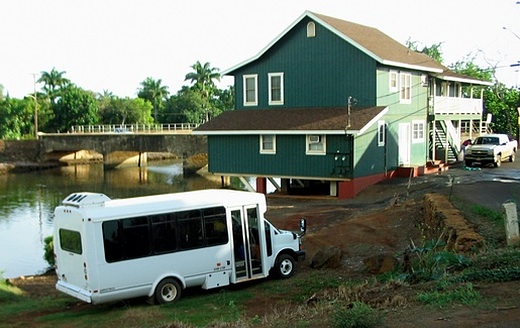SUBHEAD: Dialog on Monsanto plans to pull current GMO development from Kauai.
Image above: Monsanto headquarters in Hanapepe along he river next to the 1911 Bridge.Note Monsanto shuttle bus parked blocking public access boat ramp. Photo by Juan Wilson 11/7/07
[Note from Jeri: Diane Leone at The Honolulu Advertiser, Kauai Bureau and environment reporting wrote me the following.]
"Jeri,
You've probably heard the news Monsanto is removing its 30-person current workforce from Kauai by May. This "technology" group worked on early phase development of seed corn, about 70 percent of it GMO. Those jobs are moving to other Monsanto Hawaii operations on Maui, Molokai and/or Oahu. The people have the option to transfer or take severance.
Meanwhile, Monsanto is considering having another of its groups move to Kauai, but hasn't made the final decision. If they come, they will be planting larger quantities of seed corn at a farther along stage of the development process. This could mean more acreage and fewer people. They might also decide to leave Kauai entirely.
I'd like to put this move by Monsanto into context with the seed company business on Kauai and in the state. So your observations as part of GMO-Free Hawaii are welcome.
Aloha Diane"
[Note from Jeri: My response follows.]
Aloha Diane,
Thank you so much for the opportunity to comment on the latest news of Monsanto leaving Kaua`i and moving their operations to Oahu, Molokai and Maui.
While we feel great regret for these sister islands and our ohana, we are very thankful for this turn of events. While Monsanto's time on Kaua`i has been relatively short and in areas limited to Hanapepe, Poipu and Puhi (to the best of our knowledge) we are extremely concerned about the pollution left behind. Very few studies have been done on how to mitigate contamination of soil and bacteria where genetically engineered crops have been grown.
We are assembling a group of concerned local farming advocates to address a protocol on how these lands could be cleaned and cleared of genetically modified organisms and the heavy applications of multiple herbicides and fossil fuel based fertilizers. We are discussing possibilities of seeking leases to local growers for the production of island grown food. It actually provides an opportunity for conversations with the land owners to think about local food production
The impact of GMO’s on soil organisms is not commonly studied, especially Bt crops which produce pesticides. Soil fertility, and the organisms which maintain the fertility of soil are a vital aspect of the environment, especially in the context of food and agricultural production.
Kaua`i farmers and KCC students are finding many new ways to restore micro-organisms into the soil. With healthy soil crops do better and lessen the need for chemicals.
One such method practiced by growers here and across the world is the use of cover crops or green manures. Before industrialized agriculture and oil bases fertilizers, the process of crop rotations and letting fields go fallow was a necessary step to keep soil healthy and nutrient rich. This is a vital step to growing nutrient rich food. Studies have shown that much of the grocery store produce does not care the rich array of vitamins that they once did. This is why many people take vitamin supplements, healthy food starts with good soil.
Our hope is that we can create new jobs on Kaua`i growing seed for cover crops and organic seed production. These jobs would be much less toxic to the field workers and insure that traditional crops continue to provide seed to the farmers who grow our food.
While on Kaua`i the Monsanto fields in Puhi had guards on site 24/7, our county government had no disclosure as to the true nature of these experiments or what they were hiding. During the heavy rains at the end of last year, neighborhoods in Hanapepe were evacuated when a cargo container at the Monsanto test site was lifted into the water of the swollen river. The container floated down the river to the ocean where the contents of agricultural chemicals all dumped into the sea. While this was on the front page of the Garden Island newspaper, no one was ever held responsible for the pollution that went into our reef and ecosystems.
Economically speaking, these business models of sustainability and food sovereignty are a solid base to grow our tourist industry and insure Hawai`i's reputation as a place to experience a clean environment, delicious locally grown food and the aloha of healthy residents. We should not be the epicenter for these controversial open air field tests.
Currently these biotech company's are receiving huge state and federal subsides and tax incentives to come here. Most of the seed company profits are realized out of state, we experience little benefit and receive much environmental degradation that we will be left for us to mitigate.
It is irresponsible for us to ignore the need for food security. The patenting of GMO seed and corporate control of our food supply is the opposite of what Hawai`i needs. Our isolation and year round growing climate are the assets that should allow for us to feed ourselves and export to others. Feeding our people is dependent on clean seed, revitalized soil, healthy bee's, access to water and a living wage for farmers. Let's subsidize the farmers, not the commodity crops by putting something down on our future, and the culture of the Hawaiian people.
Contact info:
Jeri at
hawaiiSEED.org at (808)651 1332 or
MiKey at GMO Free Kauai at (808) 651-9603
See also:

No comments :
Post a Comment